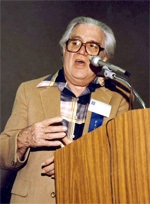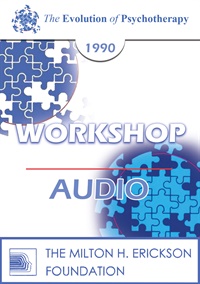EP90 Workshop 25 - The Therapeutic Family Reunion - Carl Whitaker, MD
- Average Rating:
- Not yet rated
- Topic Areas:
- Workshops | Family Therapy | Psychotherapy | Transference / Countertransference
- Categories:
- Evolution of Psychotherapy | Evolution of Psychotherapy 1990 | Pioneers in Couples and Family Therapy
- Faculty:
- Carl Whitaker, MD
- Duration:
- 2 Hours 52 Minutes
- Format:
- Audio Only
- Original Program Date:
- Dec 15, 1990
- License:
- Never Expires.
Description
Description: Carl Whitaker explores honesty in family therapy, emphasizing therapist boundaries and self-awareness. He introduces "parallel play" to navigate family dynamics and discusses intergenerational patterns, past traumas, and systemic relationships. Role-play exercises highlight communication strategies, while co-therapy and cultural influences are examined. Whitaker also shares experiences with complex cases, underscoring the need for therapist self-care.
Syllabus Description: A multigenerational approach using co-therapy can enhance the effectiveness of family therapy. Cross-generational feedback avoids imprisonment in traditional transference. Family stress episodes can be seen as a multiprojectional process.
Educational Objectives:
- To describe the role of the therapist as a symbolic "foster parent"
- To understand how to construct the family group as the "patient" in need of treatment
*Sessions may be edited for content and to preserve confidentiality*
Credits
Handouts
| Timestamped Transcript (1.9 MB) | 53 Pages | Available after Purchase |
| Ericksonian Learning Snapshot (264.4 KB) | 2 Pages | Available after Purchase |
Faculty

Carl Whitaker, MD Related Seminars and Products
Carl Whitaker, MD, was an American physician and psychotherapy pioneer family therapist. Whitaker is most well-known for acknowledging the role of the entire family in the therapeutic process. He is the founder of experiential family therapy, or the symbolic-experiential approach to therapy. Rather than scapegoating one family member or even a specific family problem, experiential family therapy looks at the entire family system. Several other approaches to family therapy have drawn heavily from Whitaker's theories.


